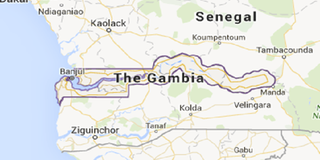Senegal and Gambia resolve border route row

The border crossing point has been at the centre of a long diplomatic row between the two countries, especially since President Jammeh seized power in 1994.
What you need to know:
This action sparked a price hike on basic commodities in Gambia, which imports much of its merchandise from Senegal.
Gambia (NMG) Gambia has agreed to scrap the contested tariff charged on Senegalese commercial trucks thereby ending their border dispute.
A Gambian minister announced the decision during a meeting on Sunday in Dakar.
Senegal had insisted that its commercial trucks would continue to boycott the Gambian ferry until the tariff was reduced.
Ms Neneh Macdouall Gaye said the tariff would return to its initial charge of 4,000 CFA francs, rather than the 400,000 CFA francs that sparked the stalemate on April 1, 2016.
Peaceful means
“Our president (Yahya Jammeh) says he is a pan-Africanist and as such would always resort to peaceful means of resolving a dispute with an African country,” the minister said.
Senegalese transport union officials called on commercial trucks operators to use the longer road around Gambia to get to southern Senegal, thereby boycotting the latter's ferry crossing point.
This action sparked a price hike on basic commodities in Gambia, which imports much of its merchandise from Senegal.
It also reportedly caused Gambia a huge loss from the border crossing tariff on the thousands of commercial trucks that use the route each day.
Hamper navigation
During the Sunday crisis meeting, the two sides also touched on the construction of the World Bank-funded bridge over the River Gambia to replace the ferry and hasten vehicle traffic.
The Gambian delegation seized the opportunity to clarify that the country was not against the bridge, but insisted that it should be built in such a way that it did not hamper navigation on the river.




